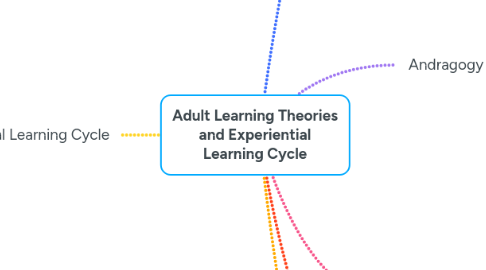Adult Learning Theories and Experiential Learning Cycle
by Leyri Walescka Ruiz Aleman


1. Experiential Learning Cycle
1.1. Constructive Knowledge
1.1.1. Experience and learning
1.2. Learn by doing
1.2.1. Involvement and reflection
1.3. Cycle
1.3.1. Concrete experience
1.3.1.1. Actual experience
1.3.1.1.1. Experience
1.3.2. Reflective Observation
1.3.2.1. Reflect on the experience
1.3.2.1.1. Reflect
1.3.3. Abstract Conceptualization
1.3.3.1. Learn from the experience
1.3.3.1.1. Conceptualize
1.3.4. Active Experimentation
1.3.4.1. Try out what you have learned
1.3.4.1.1. Test
2. Adult learners
2.1. are experienced
2.2. have background information
2.2.1. new knowledge is related to it
2.3. have established values and beliefs
2.4. have pride
2.4.1. environment needs to be supportive
2.5. need to be engaged intead of guided
3. Andragogy Theory
3.1. Adults are self-directed
3.2. Adults' reservoir of experience increases their learning
3.3. Adults are expected to take responsibility
3.4. Adults need to know why they are learning something
3.5. Adults need to be involved in problem-solving.
4. Action Learning Theory
4.1. Community learning
4.1.1. Adults work together to solve problems or projects.
4.2. Dynamic approach
4.2.1. Learn from experience and reflection
5. Project-Based Theory
5.1. Cooperative learning
5.1.1. Builds teamwork
5.2. Real-life scenarios
6. Self-directed Learning Theory
6.1. Reflection and action process
6.2. Informal learning
6.3. Adults take responsibility for their own learning.
6.3.1. Goals, needs, resources, strategies, and outcomes
